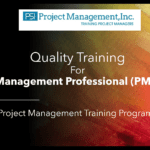In the “Practical Project Management” course, we delve deep into essential skills, practical insights, case studies, and hands-on experience to equip project managers with the tools they need to excel in their roles. Through comprehensive guidance, participants will gain a holistic understanding of project management and its various facets, ensuring successful project outcomes.
Three-Day Course (24 Hours) 8:00 AM until 5:00 PM Eastern Time This Course Is Live Virtual
Cost of Course: $1,095, including tuition and materials. All courses are guaranteed to run.
Course PDUs: This course provides 24 PDUs for students who are PMP® or CAPM® certified.
Equipment Requirements For Courses:
To participate in the virtual classes, all students must have the following:
- Quiet workspace
- Computer
- Network connectivity
- Adequate for Zoom participation
- Adequate for interactive online test
- Adequate for view online videos
- Software to include:
- PDF reader/form filler, such as Adobe
- Microsoft Word or equivalent
- Microsoft Excel Workbook or equivalent
Prerequisite Requirements:
The student must be an experienced project manager or must have completed the Introduction to Project Management Course or Project Management Fundamentals Course. Other project management training may be accepted in lieu of the two above courses.
Course Objectives and Description of Course:
PSIPM’s “Practical Project Management Course” is designed for project managers who want to develop or improve their project management methodology. This course is based on generally accepted project management practices and procedures. It is also based on a practical application flow of the ten knowledge areas, five process groups, and forty-nine processes that make up the framework of the Project Management Institute’s (PMI) A Guide to the Project Management Body of Knowledge – Sixth Edition, Project Management Institute, Inc. 2017 (PMBOK® Guide). The practical application of each process and project management terminology are covered in this course. Example project management subsidiary plans and working documents are provided and discussed throughout the course. The course is dedicated to developing a firm understanding of what is required for projects to be successful and to enable the repeatability of successful project management. Embedded in the course is a workshop where a case study is analyzed and the project management plan/documents are completed.
Certification:There are no certifications provided for completing this course. However, the twenty-four hours of attendance in this course will contribute to the prerequisite requirements of training hours required for the Project Management Professional exam or the Certified Associate in Project Management exam.
A certificate of completion will be provided for completion of this course.
Enroll Now In Our Practical Project Management Course For Project Managers!
Exploring A Guide to the Project Management Body of Knowledge – Sixth Edition, Project Management Institute, Inc. 2017 (PMBOK® Guide)
In the realm of project management, the Project Management Body of Knowledge (PMBOK® Guide) serves as a fundamental cornerstone. This comprehensive guide, developed by the Project Management Institute (PMI), outlines the essential practices, principles, and processes that constitute the core of successful project management.
As seasoned project managers, embarking on a journey of project management training through our “Practical Project Management” course, you’re poised to acquire indispensable project management skills that align with the PMBOK® Guide. This course propels you into an ever-evolving industry where real-world challenges necessitate astute leadership and proficiency in managing projects.
The PMBOK® Guide offers a systematic framework that helps professionals execute projects efficiently and effectively. Its methodology is rooted in the collective wisdom of project management experts from various sectors and industries, making it a versatile and universally applicable resource.
Our commitment to your professional development encompasses not only theoretical knowledge but also practical application. Through case studies, interactive exercises, and collaborative discussions, you’ll gain insights into how the concepts from the PMBOK® Guide translate into real-world scenarios. This approach empowers you to navigate complex challenges and seize opportunities that emerge during project execution.
As you immerse yourself in the world of project management, remember that the PMBOK® Guide serves as a reliable compass. By mastering its principles and methodologies, you’ll not only be equipped to excel in project management certification but also to make a lasting impact on the projects you lead and the industry you serve.
The importance of project planning and execution
In today’s business world, effective project management plays a pivotal role in guiding organizations toward success. Whether it’s a small-scale initiative or a complex, advanced project, the role of a project manager is vital.
As a professional seeking to learn project management, PSIPM’s “Practical Project Management” course offers a comprehensive guide to the project management foundations and advanced techniques used across industries.
Our courses provide the skills needed to initiate, plan, execute, and complete more projects successfully. This course is for seasoned project managers in need of upskilling. The course is designed to help you gain the competency required to excel in completing successful projects.
Led by experienced instructors from various industries, the course offers instructor-led live sessions. As a working professional aiming to enhance your leadership skills or project management skills, this course equips you with the tools and techniques necessary for efficient project execution.
The “Practical Project Management” course also emphasizes problem-solving, estimation, and communication skills you need to navigate projects without missing a beat. Throughout the process, you’ll learn essential techniques used, especially in large projects, to ensure productivity and meet deadlines. Our course options cater to your specific qualifications, whether you’re starting your project management journey or already hold certifications in the field. If you are an aspiring project manager, it is recommended that you complete the Introduction to Project Management and Project Management Fundamentals prior to taking this course.
By completing this course, you’ll be better prepared to take on the challenges of the dynamic business world. The course not only enhances your project management experience but also adds a valuable credential to your professional profile. With the knowledge gained from our course, you’ll be well-equipped to audit and improve ongoing projects and lead teams across industries to successful project outcomes.
Using project management tools for successful project completion
As a project manager, you play a pivotal role in ensuring projects are executed efficiently, on time, and within budget. To meet these demands, project managers need a robust set of skills and tools at their disposal.
The “Practical Project Management” course provided by PSIPM equips learners with the essential knowledge and practical skills necessary for effective project management. By enrolling in this course, you’ll receive comprehensive insights into the role of a project manager and the diverse skill set required to navigate complex projects.
This course helps you understand and utilize a variety of project management tools that are essential for the successful completion of projects across various industries. Led by experienced professionals in the field, the course covers topics such as human resources management, software development, problem-solving techniques, and more.
As a seasoned professional looking to enhance your skills our course is tailored to meet your needs. As a learner, you will gain a deep understanding of project lifecycles, stakeholder communication, risk management, and resource allocation.
Project managers who complete the “Practical Project Management” course are well-equipped to upskill and stay ahead in their careers. With a focus on hands-on learning and real-world scenarios, you will learn new ways to manage projects efficiently and overcome challenges effectively.
Before enrolling, you might have questions about the course content, prerequisites, or certification benefits. Check out our course flyer and course catalog for further information.
In a world where successful project completion is a critical factor for business success, mastering advanced project management techniques is essential. Enroll in our “Practical Project Management” course to gain the skills, knowledge, and confidence needed to excel in your role as a project manager.
Continuing education in project management: Why it matters
Continuing education in project management is not just a box to check; it’s a vital component of your professional growth. As the business landscape evolves, so do the methodologies, tools, and techniques used in project management.
Staying up-to-date with the latest trends and practices ensures that you remain adaptable and capable of addressing emerging challenges. This course will empower you with the knowledge to navigate changes confidently and guide your projects toward success.
What are the essential skills for a project manager?
A successful project manager must possess a diverse set of skills that go beyond technical expertise. These skills enable them to navigate complex challenges, foster collaboration, and ensure project success. From communication to leadership, a well-rounded skill set is essential for effective project management.
The Role of a Project Manager and the Skills Required for Success
The role of a project manager extends beyond task delegation and timeline management. A project manager serves as a leader, communicator, and problem solver. Effective communication skills are paramount for conveying project goals, expectations, and updates to various stakeholders. The ability to listen attentively and empathize with team members fosters a collaborative environment and ensures everyone’s concerns are addressed.
Leadership skills are pivotal in guiding a team toward a common goal. A project manager should inspire and motivate team members, encouraging them to deliver their best work. Additionally, the skill to make informed decisions under pressure is crucial to keep the project on track and manage unexpected challenges
Mastering agile project management: Benefits and challenges
Agile project management is valued for its flexibility. It lets project managers adapt to changes quickly, pleasing customers and delivering value faster. But, mastering it means understanding the methods, constant communication, and balancing shifting priorities.
Benefits:
- Flexibility: Adapt to changes promptly to stay aligned with business needs.
- Speed: Release components faster, getting value to stakeholders sooner.
- Customer Focus: Involve customers for better outcomes that match expectations.
- Efficiency: Identify and remove inefficiencies early in the process.
- Quality: Continuous testing leads to higher-quality end results.
Challenges:
- Communication: Keeping everyone informed can be tricky, especially in distributed teams.
- Scope Changes: Balancing change while controlling project scope can be tough.
- Shifting Priorities: Adapting to new directions without losing focus is a challenge.
- Implementation: Successfully adopting agile methods requires understanding and effort.
- Constant Improvement: Embracing change and learning continuously can be demanding.
In the “Practical Project Management” course,project managers learn to tackle these challenges and leverage these benefits effectively.
Resource management and team coordination in project management
Resource management involves allocating and optimizing resources like time, budget, and manpower to achieve project objectives. A project manager needs to balance resource allocation efficiently to prevent overburdening team members while meeting project deadlines. Team coordination involves fostering collaboration, resolving conflicts, and ensuring that each team member’s skills are effectively utilized.
The ability to anticipate resource needs, delegate tasks, and facilitate effective communication among team members is crucial for seamless project execution.
Risk management: Identifying and mitigating project risks
Every project entails risks that can impact its success. A skilled project manager identifies potential risks, assesses their impact, and devises strategies to mitigate them. Proactive risk management minimizes the chances of setbacks and enhances the project’s overall resilience.
Skillful risk management involves constant monitoring, regular risk assessments, and adapting strategies as the project evolves. By being prepared for potential challenges, a project manager can navigate uncertainties more effectively.
PMP, CAPM, PMBOK Guide, and PMI Authorized Training Partner are registered marks of the Project Management Institute, Inc.
Practical Project Management
$1,095.00



